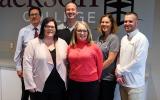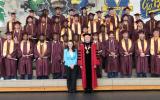Teaching and Learning

The COVID-19 pandemic and subsequent shift to online learning demonstrated to us that students can not only adapt, but also thrive when provided with diversified and complimentary instructional modes (Ascione, 2021). Inspired by the resiliency of our students, the Geographic Information Systems (GIS) department welcomed students back to Austin Community College (ACC) campuses by piloting a new course modality—Hybrid Flexible, or HyFlex. The HyFlex modality combines online and face-to-face teaching and learning activities in a regularly scheduled class where students are given the choice to...

America's workforce now has greater access to Rio Salado College classes, micro-credentials, and degree programs through a new partnership with Guild (n.d.), “a Career Opportunity Platform that enables forward-thinking employers to invest in their employees, unlocking life-changing opportunities for personal and professional growth through learning programs, career development, and one-on-one coaching” (Who We Are page).
Rio Salado College is among Guild’s newest academic partners, and one of the only community colleges to join Guild’s growing Learning Marketplace. The Marketplace provides a...

In 2016, a group of students sent a letter to Seattle Central College’s administrators to name a part of their identity they felt was being overlooked as they embarked on a journey that would be pivotal in determining their futures. The students, who were previously incarcerated, had chosen education as the path to restart their lives upon leaving a Washington state prison. While community and technical colleges are open access institutions, they are still institutions with barriers that are, at times, only visible to some of the most minoritized and marginalized in our communities. In...

Competing with 32 teams across the U.S., Calhoun Community College’s student manufacturing team placed second at the 2022 Project MFG National Championship in Wichita, Kansas. Project MFG shines a light on the need and opportunities for skilled trades by focusing on the development of new talent to provide a path forward for individuals and our country. Project MFG competitions throughout the U.S. promote the trades across industries and help advance the next generation of highly skilled trade professionals.
According to Tad Montgomery, Calhoun Machine Tool Technology instructor, the two-day...
Tags:

In January 2018, 14 local school district superintendents and Jackson College’s (JC) President and CEO, Dr. Daniel J. Phelan, initiated the launch of Jackson County Early College (JCEC), designed to offer students the opportunity to earn a high school diploma and an associate degree, certification, or up to 60 college credits. This article highlights the program’s successes since its first students walked through the doors in fall 2018.
Cost Effectiveness
Since the inception of JCEC, JC has reduced tuition and fees for early college students in a variety of ways. The college capped digital...

Congratulations to the 2021-2022 Innovation of the Year Award-winning innovations and associated team members from 32 participating League Board and Alliance member colleges! The League initiated the Innovation of the Year award over 35 years ago to recognize local community college projects and initiatives that reflect the spirit of innovation and experimentation on which our organization was founded. The competition provides an opportunity for colleges to showcase their innovative programs, practices, policies, partnerships, and resources; to celebrate the dedicated educators who are...
Tags:

Mesa Community College (MCC) and the Family Involvement Center (FIC) are collaborating to offer the Parent Peer Support Social Work Scholarship Stipend Program, an innovative program bolstering support for families overcoming past adversity and crisis while building careers in the profession of social work. Specifically, FIC and the MCC Social Work programs are piloting an education, training, and career pathway for parents with opioid/substance use disorder (OUD/SUD) and lived experience having a child involved with the Department of Child Safety (DCS).
The social work stipend program was...

Community colleges are uniquely situated to address the nation’s need for a highly innovative, adaptable, and skilled workforce. At the federal and state levels, funding is available for design and delivery of workforce-building programs combining academic excellence, technical training, and practical experience.
Santa Fe College (SF) in Gainesville, Florida, has received a state grant to create a STEM-focused charter high school. The charter school will provide students with the tools needed to be successful in the 21st century workforce. SF’s vision is to ensure that each charter school...

On February 3, 2021, I participated in a California panel discussion hosted by the Community College Research Center (CCRC) at Columbia University that addressed the cost benefits of adopting a guided pathways model. The discussion focused on two CCRC reports: The Economics of Guided Pathways: Cost, Funding, and Value (Belfield, 2020) and Funding Guided Pathways: A Guide for Community College Leaders (Jenkins et al., 2020). Based on my experience as President of Bakersfield College (BC), I assert that both reports can be extremely useful for administrators responsible for budgets, best...

Mesa Community College (MCC) launched its second Z Degree program, an Associate in Arts with an emphasis in communication, beginning in the spring 2022 semester. The college’s first Z Degree, an Arizona General Education Curriculum certificate and general associate’s degree, was introduced in 2019. A Z Degree is offered completely online with zero textbook costs, saving students time and money.
“The Z Degree offers students greater flexibility, enabling them to take classes that fit their schedule. We built this program for the students who want flexibility, less distraction, and less cost...
March
2022
For over 100 years, the community college has been evolving as one of the most effective institutions of higher education in addressing the social and economic needs of the nation. During the 1950s and 1960s, there was general agreement that the community college was a comprehensive college designed to serve the multiple needs of a diverse student body through a variety of programs, including developmental, transfer, vocational, general, and community education. In the past few decades, that purpose has been changing as the developmental, general, and community education programs have been...

Calhoun Community College and Drake State Community & Technical College officials have developed a partnership that will not only address learning obstacles for adult learners, but job training needs as well. Greater Opportunities for Adult Learners (GOAL) is a free program designed specifically for individuals who do not have a high school diploma and want to become more employable. Individuals who enroll in the program have access to educational resources focused on improving their reading, math, and language skills to obtain a GED, learn English as a second language, and/or earn a...
Tags:
January
2022
Students are drawn to the arts through their desire to create, perform, express, and interact with other people. In March 2020, the give and take, central to creating art, was gone. The COVID-19 pandemic forced many students in the visual and performing arts to create in boxes on computer screens with spotty picture resolutions and sound distortions, depending on Internet speed, the weather, devices, and countless other factors.
Kirkwood Community College, like numerous other institutions, scrambled to figure out how to get art materials, microphones, speakers, and Internet access to students...

This summer, dozens of middle school students in Pittsburgh, including those from underserved communities, discovered that science, technology, engineering, and math (STEM) is fun, that it’s ok to be smart, and that education can offer a path to a brighter future. Through a partnership with Verizon and the National Association for Community College Entrepreneurship, the Community College of Allegheny County (CCAC) hosted the Verizon Innovation Learning STEM enrichment program. The initiative is part of Citizen Verizon, the company’s responsible business plan for economic, environmental, and...

In the December 2020 issue of Innovation Showcase, Diane Janes and Lorraine Carter (2020a) described educational institutions’ pivot to “remote operations, quarantine, and technology-enabled strategies for working and learning” in the midst of the COVID-19 pandemic (para. 1). In particular, the article described how Southern Alberta Institute of Technology (SAIT) ensured the techno-resiliency of instructors. In response to the shift to fully online teaching and learning, the Centre for Academic Development and Innovation (CADI) created several initiatives, including the Teaching Online at...

Johnson County Community College (JCCC) has partnered with Butler Community College (BCC) to offer expanded training in culinary arts. This opportunity allows JCCC to extend the benefits of its Chef Apprenticeship program to more Kansas students. In turn, the collaboration strengthens state and local workforce opportunities.
Through this agreement, BCC is offering two additional certificates to students in South Central Kansas. The new certificate options use existing BCC culinary courses with the addition of practicum courses from JCCC. Along with invaluable industry training, students in...
Tags:

At Mesa Community College’s Thunderbird Tech Studio, students can receive one-on-one guidance and tutoring for using and mastering technology that supports their academic learning. The Tech Studio team provides support for common college-supported technology tools such as Windows and Mac operating systems, Microsoft Office, Google Drive Suite, Canvas, and other systems. The beauty of the Thunderbird Tech Studio design is that it will morph into an in-person service once the pandemic subsides, thus allowing students to choose when, where, and how they receive technology tutoring and assistance...

For decades, Jackson College (JC) has been a U.S. leader in providing higher education access and opportunity to incarcerated students. The town of Jackson, Michigan, has long been known as a “prison city,” and three large correctional facilities are located less than 15 miles from JC’s Central Campus. In 1967, the college offered its first class “inside the walls.” In 1969-1970, a pilot prison education program for the Southern Michigan Prison was launched to provide qualifying inmates an opportunity to further their education.
Jackson Community College (as it was then called) was one of 26...
Tags:
June
2021
Congratulations to the 2020-2021 Innovation of the Year Award recipients from 32 participating League Board and Alliance member colleges. The League initiated the Innovation of the Year award over thirty-five years ago to recognize local community college projects and initiatives that reflect the spirit of innovation and experimentation on which our organization was founded. The competition provides an opportunity for colleges to showcase their innovative programs, practices, policies, partnerships, and resources; to celebrate the dedicated educators who are responsible for such exceptional...
Tags:










